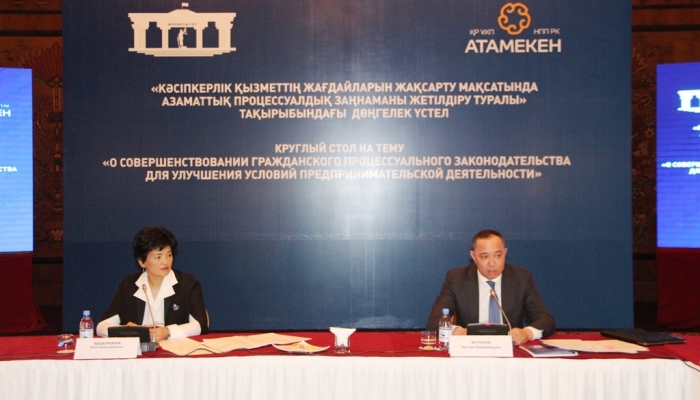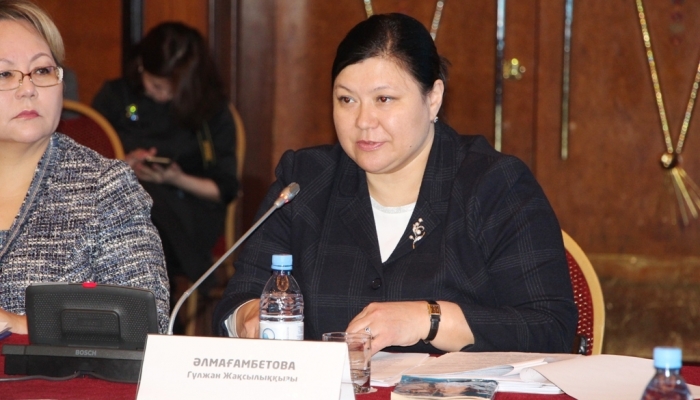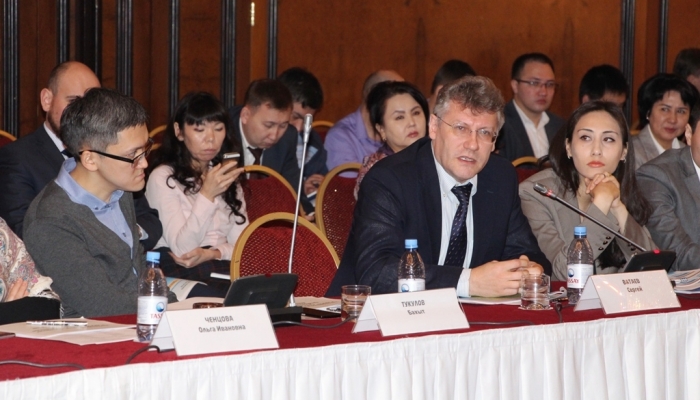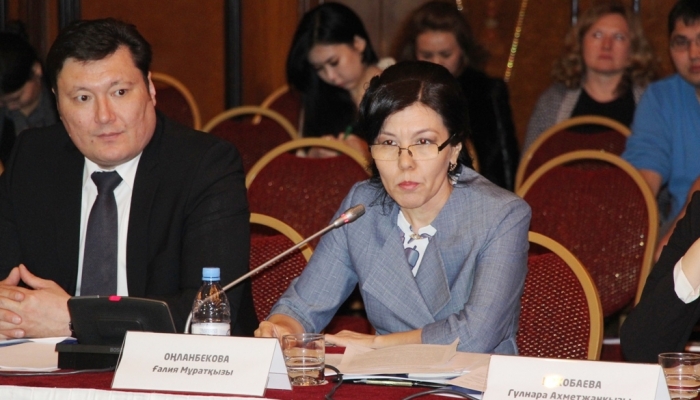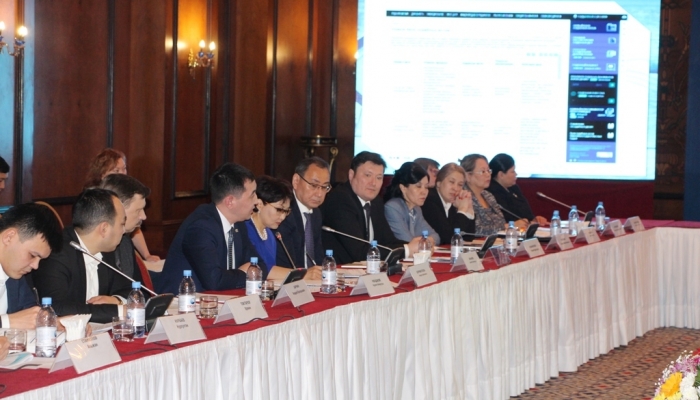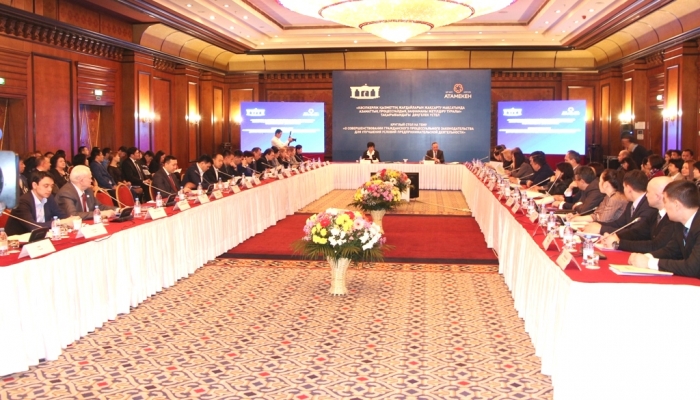Mon, 03/06/2017 - 14:19
Today in Almaty there was a "round table" on: "On improving civil procedural legislation to improve business conditions".
The event was organized by the Supreme Court together with the National Chamber of Entrepreneurs "Atameken".
Aigul Kydyrbaeva, the chairman of the Specialized Judicial division of the Supreme Court, Rustam Zhursunov, Deputy chairman of the Board of the Atameken, Aigul Kenzhebaeva, the chairman of the Board of the Association of Commercial Lawyers of Kazakhstan "Kazakstan Bar Association", as well as judges of the Supreme Court and local courts, representatives of state authorities, the business community and the media took part in the conference.
Opening the roundtable, A. Kydyrbaeva noted that during the years of Independence, the national justice has become a reliable guarantee for the supremacy of law and stability in society and the level of judicial protection of citizens' rights in Kazakhstan is as close as possible to advanced international standards. The judicial system within the framework of the Plan of Nation "100 specific steps" has been substantially modernized.
"Much attention is paid to this issue personally by the Head of State, who has repeatedly noted the special place of the judicial system in protecting the business entities rights, investors and creating optimal conditions for their effective activity," Kydyrbaeva stressed.
Systematically, work is carried out to simplify the legal proceedings, expand access to justice and create the most favorable climate for supporting entrepreneurship.
One of the main innovations is separate legal proceedings on investment disputes. By reducing judicial instances for investors, increasing the responsibility of the judges of the appellate and cassation courts, it is aimed at ensuring a qualitative legal protection of their rights and legitimate interests.
The practice of application the new civil procedure code from 2016 shows that with its adoption, the most effective conditions have been created for the protection and restoration of violated rights and legitimate interests. Despite the short period of practical application of the CPC, the qualitative influence of its innovations on the work of the courts became apparent. If under the old system of justice, certain categories of cases were considered within a year and a half years, today they are settled for a maximum of 8 months.
At the same time, more than 82% of civil cases are considered in one court session, about 10% in two, and 59% in simplified proceedings, i.е. without calling in the courts for about a million participants of the process.
Then, the Deputy chairman of the Board of the Atameken R.Zhursunov and the chairman of the Managing Board of the Association of Commercial Lawyers of Kazakhstan ‘KazBar’ A.Kenzhebayeva delivered a welcoming speech.
Judge of the Supreme Court G.Almagambetova in her speech stressed the attention of those present on the innovations of the civil procedural legislation aimed at improving the conditions for entrepreneurship. The implementation of changes in the CPC meets the requirements of international standards for the content of procedural legislation, proceeding from those tasks and principles on which the administration of justice in civil cases is generally built.
G.Almagambetova also informed that the President of the Republic of Kazakhstan recently signed the Law of the Republic of Kazakhstan "On introducing amendments and additions to some legislative acts of the Republic of Kazakhstan on improving civil, banking legislation and improving the conditions for entrepreneurial activity". In accordance with it, the courts are charged with the obligation to forward or deliver, within three working days from the date of acceptance of the legal claim, copies of the legal claim and the documents attached to it to the defendant and third parties. Previously, such a duty was vested in the plaintiffs. In case of filing a legal claim in the form of an electronic document in the application of its copies, there is no need.
Also, the period for submission by the respondent a response to the legal claim is limited to 10 working days from the date of receipt of the copy of the legal claim.
In addition, the period of the first hearing is legally fixed, which must be commenced no later than 10 working days from the day of the completion of the preparation of the case for trial. Previously, such terms were not defined by law at all.
The regulation of these terms generally regulates the civil process, making it understandable for all individuals and legal entities involved in civil proceedings.
N.Moldakov, Deputy Head of the Department of Information Technologies and Information Resources Protection of the Department at the Supreme Court said" on further improvement of information systems of the Supreme Court" Judicial office "and" Bank of Judicial Acts "to expand access to justice and judicial information". He stressed that starting this year in the pilot mode, the Bank of Judicial Acts was launched. Its key feature is the search engine's work with the help of which it became possible to search for court decisions (judgments) rendered by courts in 2015-2016 on contextual indicators and categories. Participants of the forum were presented the services in real time.
In addition, according to the announced agenda, A.Korobeinikov, Senior Associate of Baker & McKenzie, and A.Kaldybayev, Executive Director of the Atameken Arbitration Center, A.Kaldybaev, Managing Director and Director of the Department for Legislation and Development of Self-Regulation of the Atameken A.Bizhanova, the judge of the specialized inter-district economic court in Almaty G.Onlanbekova, the head of the Department of Justice of Almaty G.Kokobaeva and others made a speech at the roundtable.
At the end of the forum, the participants had a businesslike and constructive exchange of views, where they could ask questions from the experts and receive detailed answers.

